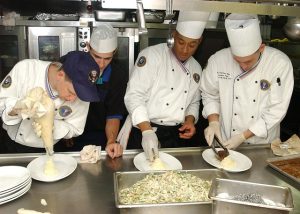 Culinary arts are a broad term that describes wide career options in catering and hospitality. A course in culinary is about the preparation, cooking, and presentation of food. Specialists in this area of work are the chefs. Expert chefs are expected to translate culinary arts to enhance the complexity, aesthetics, and nutritional value of food through their skill, creativity, and passion. In this article, we explore culinary course requirements, outlines, careers, and more.
Culinary arts are a broad term that describes wide career options in catering and hospitality. A course in culinary is about the preparation, cooking, and presentation of food. Specialists in this area of work are the chefs. Expert chefs are expected to translate culinary arts to enhance the complexity, aesthetics, and nutritional value of food through their skill, creativity, and passion. In this article, we explore culinary course requirements, outlines, careers, and more.
Culinary arts career pathways
A culinary arts course aims to empower candidates with food product skills, innovative cooking methods, and the managerial education required to operate one’s own restaurant or other hospitality service outlets. Depending on what they do on a daily basis, a person working in culinary arts can have many names: cook, chef, etc. The following are popular career options available to catering courses and culinary graduates.
- Food corporate brand ambassador
- Hotel and restaurant chef
- Personal chef
- Caterer
- Baking and Pastry Chef
- Food Service or restaurant manager
- Sommelier
- Celebrity TV chef
- Food author or blogger
Culinary arts subjects
Culinary candidates focus on core theories and concepts related to food preparation, cooking, and presentation. The following are some of the subjects covered in a culinary course.
First-year course subjects
- Introduction to Culinary Arts
- Baking and Pastry Arts
- The Art and Science of Food
- Introduction to Wine & Beverages
- Information Technology and Research Skills
- French 1 & 2
- Professional Attitude Evaluation – Year 1
- Kitchen Operations and Management
- The Best of European Cuisine
- Introduction to Kitchen Management
- Business Communication
- Food & Beverage Cost Control
- French 2
- Kenya Concepts
- Applied Hotel Operations Practicals
- 15 Weeks Industry Placement
- Professional Attitude Evaluation – Year 1
- Internship after the end of year 1
Second-year subjects
- International Cuisines: Classical to Fusion
- Food & Beverage Service Theory
- Food & Beverage Service Practical
- Business Management and Entrepreneurship (include content on process approach)
- Business Ethics
- Life Skills and Critical Thinking
- Human Resources Management
- Occupational Safety and Health Practices
- Accounting for Hospitality Industry
- Professional Attitude Evaluation – Year 2
- Food & Beverage Events Management
- Food and Beverage Management
- Fundamentals of Nutrition and Dietetics
- Legal Aspects in the Hospitality Industry
- Hospitality Marketing in the Digital Age
- Advanced Pastry and Baking Arts
- African Cuisine
- Applied Hotel Operations Practical
- Professional Attitude Evaluation – Year 2
- Internship – after the end of year 2
Entry qualifications
The entry requirements for culinary courses are KCSE Mean Grade C- (MINUS) with C- (MINUS) or above in English or Kiswahili and a D (PLAIN) in Mathematics or any Science. It takes 11/2 to 21/2 years to study the course in a culinary school in Kenya.
Is culinary arts marketable in Kenya?
Food is a basic need, thus the course is marketable considering the growing catering and hospitality sector increases the need for skilled culinary professionals. Culinary graduates can work become chefs, restaurant managers, and food entrepreneurs.
Conclusion
Culinary arts are a broad term that describes wide career options in catering and hospitality. A course in culinary is about the preparation, cooking, and presentation of food. Specialists in this area of work are the chefs. A person working in culinary arts can have many names depending on what they do on a daily basis. The person could be called a cook, chef, etc. A diploma course can take 11/2 to 21/2 years to study the course in a culinary school in Kenya for full-time students and those under the apprenticeship program, respectively.
Join the community
Is your preferred course marketable? Do not invest your time and money in "useless courses". Your future matters to us a lot. Subscribe to our newsletter for curated articles on the marketability of each course to help you make informed educational and career choices. Join now!
